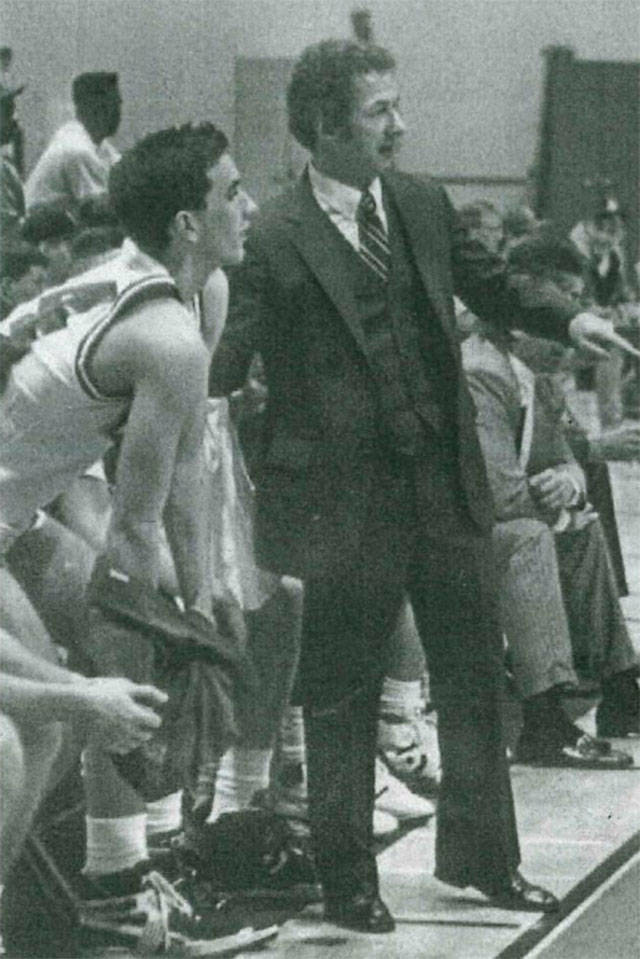One of the first things everyone says about Keith Kingsbury is that he was a character.
“I used to be president of the National High School Basketball Coaches Association,” Mountlake Terrace boys basketball coach Nalin Sood recalled about the legendary Edmonds Community College men’s basketball coach, who passed away on Aug. 24. “Two years ago we had our conference in Raleigh, North Carolina, and Dereck Whittenburg (who airballed the last-second shot that was subsequently dunked by Lorenzo Charles to give North Carolina State the 1983 NCAA national championship) was the speaker. When I told Dereck I was from Seattle he said, ‘That’s great, I met some coach from Seattle and he was a character. It was Kings-something.’ It was coach Kingsbury. We’re in Raleigh, and he couldn’t have met him more than once or twice, but everyone had the same reaction to coach.”
Kingsbury, one of the true titans of Washington State community college hoops, passed away at his home in Ferndale on Aug. 24 following a long bout with cancer. He was 79.
Kingsbury spent 36 years as a coach with the Edmonds men’s basketball team from 1969-2005, the last 32 of those as the head coach. During his tenure the Tritons won 570 games, participated in 18 postseason tournaments and won the 1985 Northwest Athletic Conference championship. He is a member of the Snohomish County Sports Hall of Fame, the NWAC Hall of Fame, as well as the Washington Interscholastic Basketball Coaches Association Hall of Fame — despite having never coached a high school game.
Those accolades alone illustrate Kingsbury’s basketball acumen.
“We had an open gym where we had about 30 guys, and we’d just put on this kid who we thought was a nice enough kid, but who we figured would end up redshirting or be an end-of-the-bench guy,” current Edmonds coach Kyle Gray said about Kingsbury’s basketball eye. “There was a lot of talent on the floor, but after 2o minutes coach comes up to me and he’s singled out this kid, saying he liked his game and that he was a hard worker. That kid ended up starting for us on a 20-win team. He knew it right away, he had that feel.”
Kingsbury, usually found clad in a sweatsuit while holding court at Seaview Gymnasium, was a small man with a big personality known for doing things his way in a style punctuated by blunt honesty. His persona drew people in, making him one of the best-connected basketball coaches in the region. He was also heavily involved with the Brewster Packing team that won five AAU national championships during the 1980s.
But Kingsbury also had an impish sense of humor, which he used to make sure his teams always had fun — when asked for their favorite stories about Kingsbury, most of those interviewed said the best stories weren’t appropriate for publication.
“I remember when I first met Kings,” said Phil Zevenbergen, who was a member of Kingsbury’s championship team in 1985 and is the lone former Triton to play in the NBA. “I hadn’t played in three years after undergoing surgery on my abdomen, and I was at Edmonds CC watching a game against Shoreline. Well, Kings followed me into the bathroom. I’m at the urinal and looked over and there’s Kings, and he asks me, ‘So where are you playing basketball next year?’ I didn’t know who he was, and I said either Edmonds or Shoreline. He said, ‘Well, I just made your decision for you, you’re playing for Edmonds.’ That’s just the way he was.”
But for all of Kingsbury’s basketball success and personality, the aspect people remember most about him is how much he cared about his players.
“He would talk about life more than he did about basketball,” said James Rowe, who was an assistant coach under Kingsbury at Edmonds from 1992-96 and again in 2001-02. “I remember we had this white privileged kid, and he was asking, ‘Why are you giving these inner-city kids second and third chances?’ Kings said, ‘Give this guy a ride home and see the environment he lives in.’ Here’s this white kid whose parents got him a car and are buying him gas, and he sees that these other kids may live next to a crack house and are having to take the bus to school.
“He did a great job bringing in kids from different backgrounds and making a team out of them.”
Said Zevenbergen: “For him it was more about the people than it was about winning championships. You never got the feeling that it was only about basketball, he cared about you. I came back for years and would scrimmage against his guys just so I could hang out with Kings.
“He was just a great guy. He was the real deal.”
Talk to us
> Give us your news tips.
> Send us a letter to the editor.
> More Herald contact information.

























